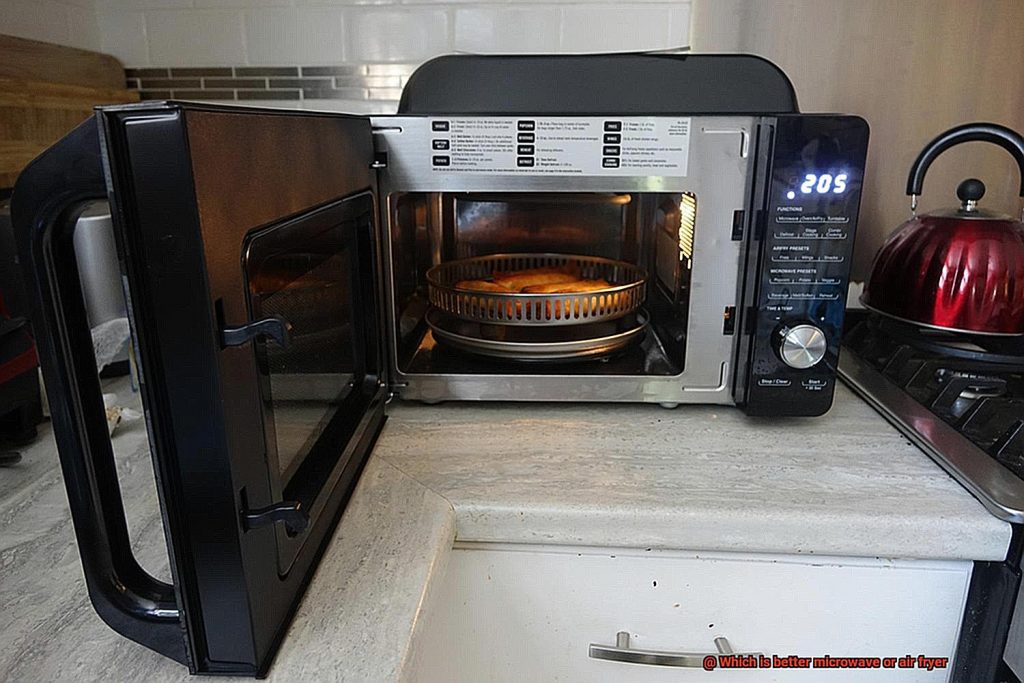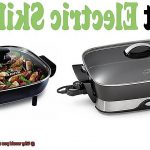Are you tired of slaving away in the kitchen, trying to prepare healthy and delicious meals for your family? Do you want to find a kitchen appliance that can make your cooking process faster and easier? Look no further than the dynamic duo of kitchen appliances: the microwave and air fryer.
Both of these appliances have become incredibly popular due to their ability to cook food quickly while still being healthy. But which one is better? This debate has been raging on for years, with both sides having their own staunch supporters.
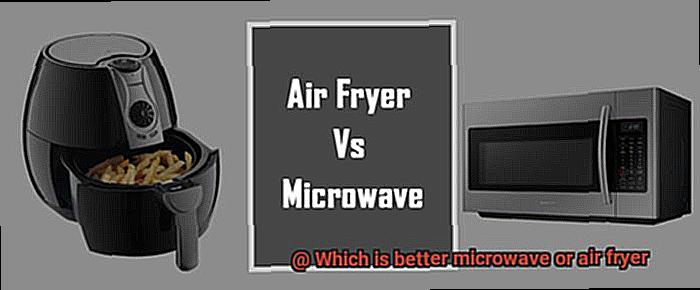
In this blog post, we’ll take a deep dive into the pros and cons of both the microwave and air fryer. We’ll explore everything from cooking methods to efficiency, as well as what types of food each appliance can handle. By the end of this post, you’ll have a clear understanding of which appliance is right for you.
So get ready to discover some exciting new recipes that will revolutionize your cooking game. Whether you’re team microwave or team air fryer, we’ve got all the information you need to make an informed decision. Let’s settle this debate once and for all.
Contents
What is a Microwave?
Microwave ovens have revolutionized the way we cook and have become an essential appliance in most households worldwide. At their core, they are a convenient and time-saving way to heat up food quickly without having to use a stove or oven. But what is a microwave, and how does it work?
A microwave oven uses electromagnetic radiation to heat up food. This radiation interacts with the molecules in the food, causing them to vibrate and create heat. The result? Deliciously hot food in a matter of minutes.
While microwaves are typically used for reheating leftovers, defrosting frozen foods, and cooking simple meals like popcorn or frozen dinners, they are not suitable for grilling or frying foods as they don’t produce the same results as traditional cooking methods.
There are different types of microwave ovens available on the market, including countertop models and over-the-range models. Countertop models are the most common and can easily be placed on a kitchen counter or table. Over-the-range models are installed above a stove and can also function as a ventilation hood.
However, if you’re looking for crispy, fried foods without using oil, air fryers may be a better option. Air fryers have gained popularity in recent years as a healthier alternative to deep frying. They work by circulating hot air around the food, which cooks it evenly and gives it a crunchy exterior.
Air fryers can cook everything from chicken wings to vegetables, making them a versatile option for those who like to experiment with different recipes. They are an excellent choice for people who want to enjoy fried foods without all the added calories and fat.
Ultimately, whether you choose a microwave or an air fryer depends on your personal preferences and cooking needs. If you’re looking for quick and convenient cooking with minimal cleanup, then a microwave might be the way to go. However, if you want healthier options and crave crispy, fried foods without all the added calories and fat, then an air fryer might be the better choice.
What is an Air Fryer?
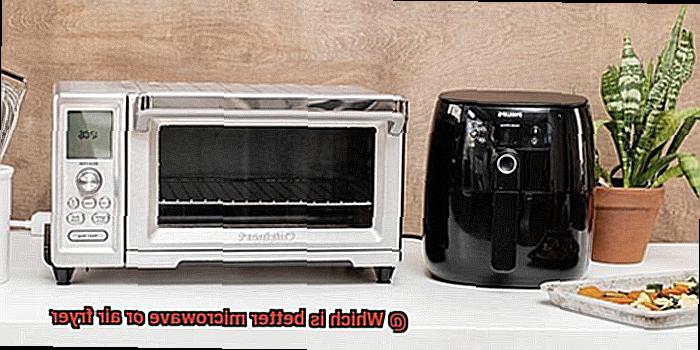
Meet your new kitchen companion – the air fryer. As an expert on this revolutionary appliance, let me introduce you to what an air fryer is and why it’s a game-changer for your cooking routine.
At its core, an air fryer is a countertop appliance that uses hot air circulation to cook food. It’s a healthier alternative to deep frying, as it requires little to no oil to cook food. This means that you can indulge in crispy and delicious treats without worrying about the added calories and fat.
But an air fryer isn’t just limited to frying. It can also grill, roast, and bake your favorite foods to perfection. From chicken wings to veggies to baked goods, the possibilities are endless with this versatile appliance.
One of the best things about using an air fryer is how fast and efficient it is. It cooks food much faster than a conventional oven, and the results are consistently crispy and evenly cooked. Plus, cleaning up is a breeze with removable parts that are dishwasher safe.
Air fryers come in various sizes, shapes, and models, offering additional features such as grilling and roasting functions. You can use them to cook a wide variety of foods, from french fries to vegetables to baked goods.
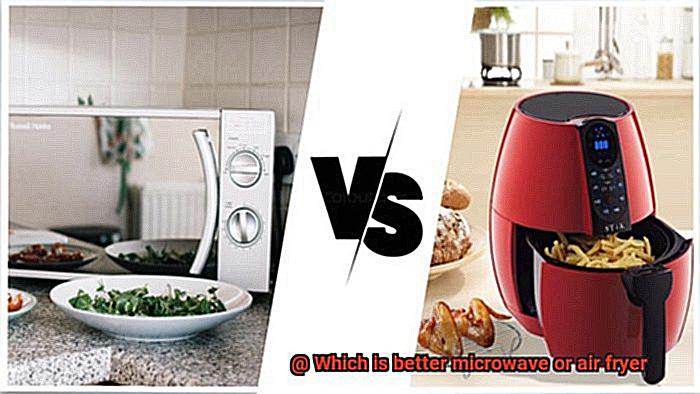
Comparison of Microwaves and Air Fryers
Microwaves and air fryers serve a similar purpose, but they have some key differences that make them better suited for certain types of cooking. Microwaves use electromagnetic waves to heat up food quickly and efficiently, making them perfect for reheating leftovers or cooking frozen meals in just a few minutes. However, they are not ideal for foods that require a crispy texture, such as fried chicken or french fries.
On the other hand, air fryers use hot air circulation to cook food, which gives it a crispy texture without the need for oil. This makes them perfect for those who love fried foods but want to avoid the added fat and calories. Air fryers are also faster than traditional ovens, making them a great option for busy individuals who want to save time in the kitchen.
When it comes to health, air fryers are often seen as the healthier option because they require little to no oil to cook food. This means that you can enjoy your favorite fried foods guilt-free. In contrast, microwaves do not add any extra fat to your food but can sometimes lead to nutrient loss due to the high heat used in the cooking process.
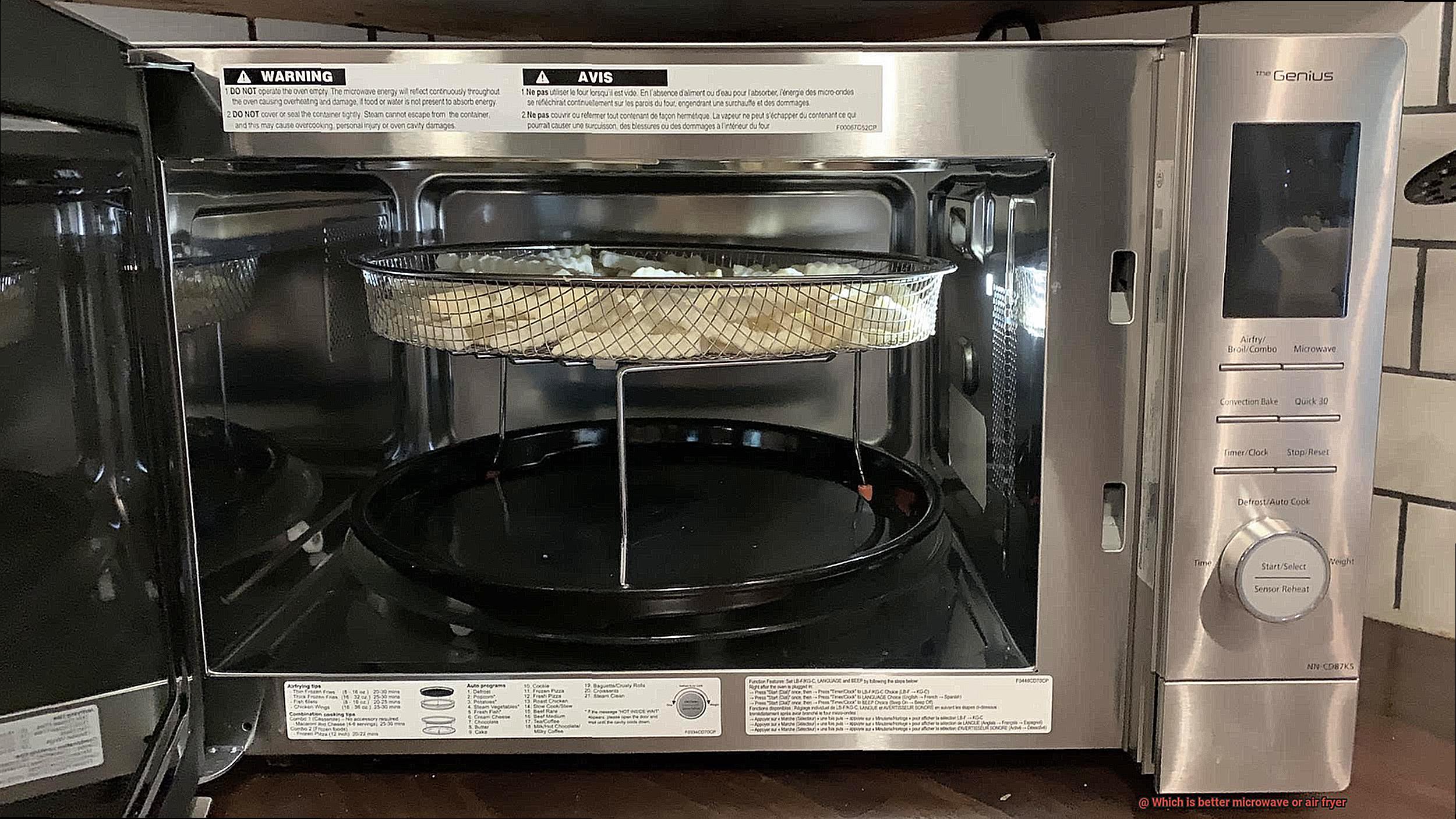
So which appliance should you choose? It ultimately depends on your personal preferences and cooking needs. If you’re looking for quick reheating or simple cooking methods, a microwave is the way to go. But if you want healthier and crispier versions of your favorite fried foods, then an air fryer is definitely worth considering.
In summary, both microwaves and air fryers are fantastic kitchen appliances that offer unique benefits. To help you decide which one is right for you, here’s a quick rundown:
Microwaves:
- Ideal for reheating leftovers or cooking frozen meals quickly
- Not well-suited for foods that require a crispy texture
- Don’t add any extra fat to your food but can sometimes lead to nutrient loss
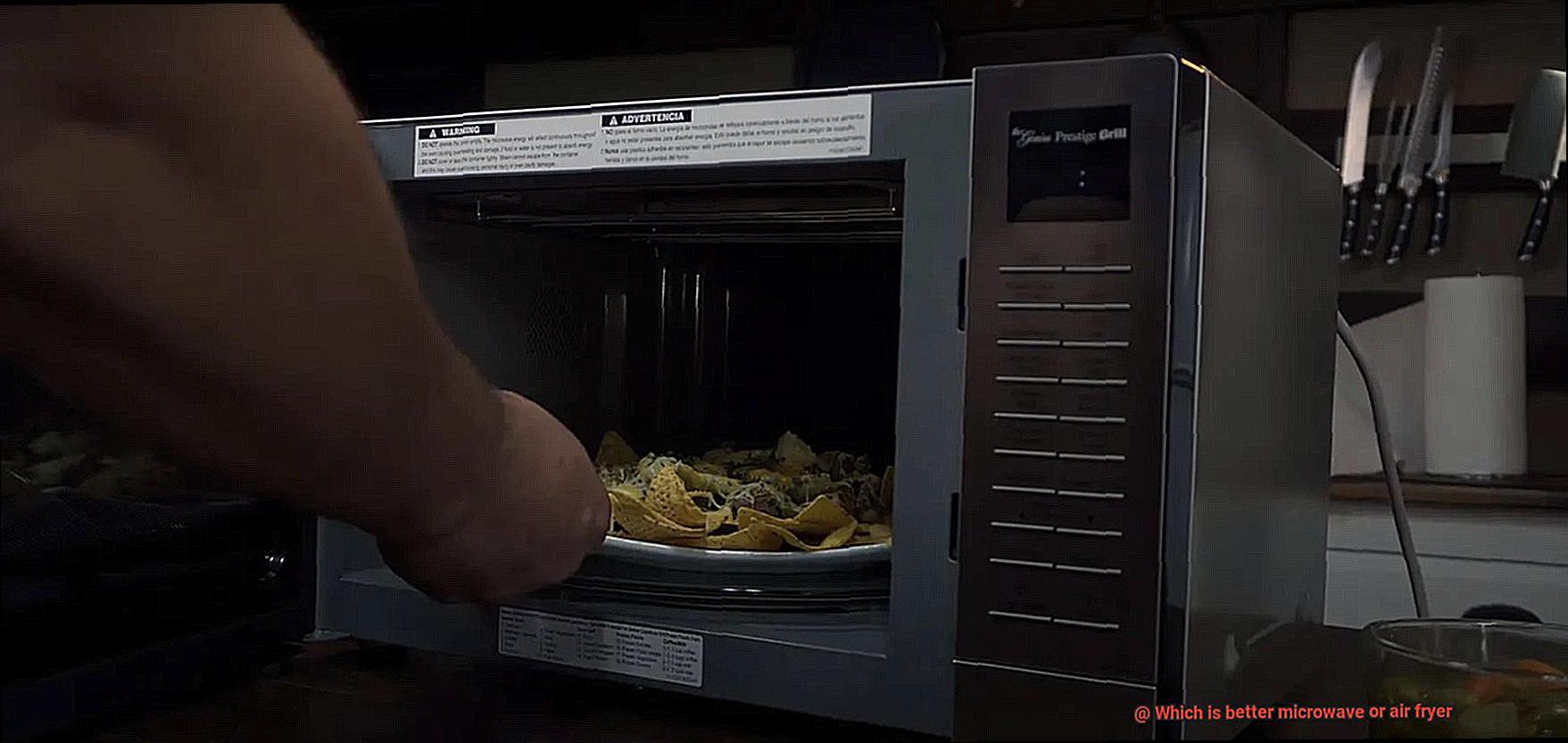
Air fryers:
- Perfect for cooking crispy, fried foods without the use of oil
- Cook food faster than traditional ovens, making them a great option for busy individuals
- Often seen as the healthier option due to their low to no oil usage
Advantages of Using a Microwave
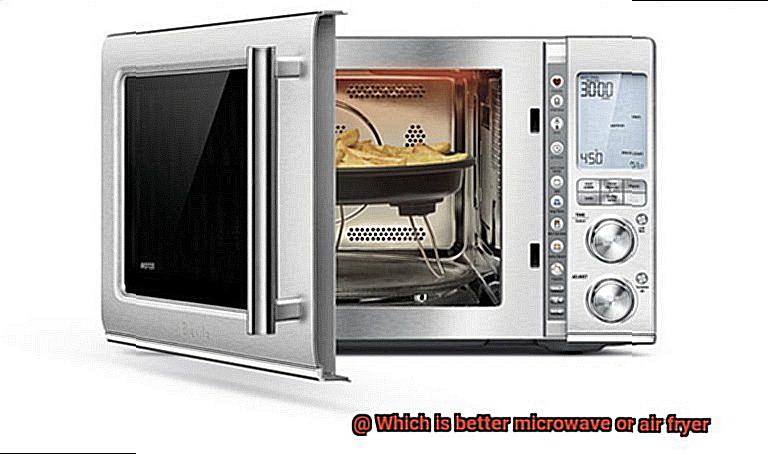
First and foremost, microwaves are time-saving machines. They use direct heat to cook your food quickly and efficiently, saving you valuable time in the kitchen. No more waiting for water to boil or meat to thaw; with a microwave, you can have a hot meal in minutes.
But that’s not all – microwaves are also energy-efficient. Traditional ovens and stovetops use more energy and emit more heat, making your kitchen feel like a sauna. Microwaves, on the other hand, use less energy and emit less heat, making them an eco-friendly option for your home. Plus, they won’t heat up your kitchen on a hot summer day.
Cleaning up after cooking can be a hassle, but not with a microwave. Most models have removable turntables and easy-to-clean interiors, so you can spend less time scrubbing and more time enjoying your meal. And speaking of meals, microwaves are versatile machines that can be used for defrosting frozen foods, reheating leftovers, and even cooking full meals.
But did you know that microwaving can also help retain nutrients in your food? The short cooking time and direct heat can preserve vitamins and minerals that might be lost during longer cooking times. This means you can enjoy healthier meals without sacrificing convenience.
Advantages of Using an Air Fryer
As an expert in the culinary world, I’m here to tell you about the numerous advantages of using an air fryer.
First and foremost, air fryers offer a healthier cooking option. By using little to no oil, you can achieve crispy and delicious results without the added calories and fat that come with traditional frying methods. Say goodbye to greasy meals and hello to guilt-free indulgences.
But that’s not all. Air fryers are incredibly versatile, allowing you to cook a wide range of foods. From chicken wings and french fries to roasted vegetables and even desserts, the possibilities are endless. Plus, some models come with additional accessories like baking pans and grill racks, making it even easier to experiment with different recipes.
Another great advantage of using an air fryer is time-saving. Unlike traditional ovens that can take forever to preheat, air fryers heat up almost instantly. This means you can have dinner on the table in a fraction of the time it would take using other cooking methods.
Cleaning up after cooking can be a hassle, but air fryers make the process much easier. Most models come with removable parts that can be easily washed in the sink or dishwasher. Plus, since they don’t require any oil, there’s no greasy mess to clean up after cooking.
Lastly, air fryers are energy-efficient since they are smaller than traditional ovens, which require less energy to operate. This means you’ll save money on your energy bill while still being able to enjoy delicious and healthy meals.
Disadvantages of Using a Microwave
Microwaves have revolutionized the way we cook and heat our food, providing us with quick and easy meals in mere minutes. However, as an expert in the field, it’s important to highlight the potential downsides of using a microwave.
One major disadvantage is its impact on the nutritional value of food. Microwaving can cause a loss of essential vitamins and minerals due to the radiation used to generate heat. This can be detrimental to those looking to maintain a healthy diet. Furthermore, microwaving can alter the chemical structure of food, potentially creating harmful substances that could pose a threat to our health.
Another issue with microwaves is uneven heating. This can lead to some parts of the food being overcooked while others remain undercooked or even cold. In some cases, this can also lead to foodborne illness if harmful bacteria are not fully eliminated during the heating process.
Lastly, while microwaves are great for reheating leftovers and quickly cooking simple meals, they may not be suitable for more complex dishes or recipes that require specific cooking methods or temperatures. This limitation can be frustrating for those who enjoy cooking and experimenting with new recipes.
Disadvantages of Using an Air Fryer
Before making this investment, it’s essential to understand the potential disadvantages that come with this appliance. As an expert in this field, I’ve compiled some research notes that outline the downsides of using an air fryer.
Firstly, one of the most significant disadvantages of using an air fryer is its limited capacity. These appliances are typically designed to cook small portions of food, making them unsuitable for large families or groups of friends. If you’re planning on cooking for a crowd, then an air fryer may not be the best option for you.
Another potential downside is that air fryers can take longer to cook certain foods than a microwave. Frozen foods like chicken nuggets or fries may take longer to cook in an air fryer than in a microwave. It’s important to keep in mind that cooking times vary depending on the type and quantity of food, so be sure to do your research before cooking.
In addition to these limitations, air fryers are also more expensive than microwaves, which can deter some people from buying them. And while they offer many benefits, their high cost can be a significant disadvantage for those on a budget.
Another thing to keep in mind is that air fryers require preheating before use, which can take up additional time. If you’re looking for a quick cooking method, then a microwave may be more suitable for you.
Lastly, although air fryers are versatile, they cannot replace all kitchen appliances like microwaves can. For example, air fryers cannot defrost or reheat food as well as microwaves can. If you want an appliance that can do multiple tasks, then a microwave may be more suitable for your needs.
H84DbPuewaU” >
Conclusion
In conclusion, the ongoing debate between microwaves and air fryers has sparked a loyal following for both appliances. However, after weighing the pros and cons of each option, it’s clear that they both offer distinct advantages that can simplify and speed up your cooking process.
Microwaves are perfect for reheating leftovers or quickly cooking frozen meals while also being energy-efficient. Nevertheless, they fall short when it comes to achieving a crispy texture in foods like fried chicken or french fries. Conversely, air fryers offer a healthier alternative by using little to no oil and their versatility allows you to cook a wide range of dishes. They also save time in the kitchen and are easy to clean up after cooking.
It is worth noting that microwaves may cause nutrient loss due to high heat usage during the cooking process. On the other hand, air fryers can take longer to cook certain foods than microwaves, have limited capacity and can be more expensive.
Ultimately, choosing between a microwave or an air fryer depends on your personal preferences and cooking needs. If you’re looking for quick reheating or simple cooking methods, then a microwave is the way to go. But if you want healthier versions of your favorite fried foods without all the added calories and fat while achieving a crispy texture, then an air fryer might be the better choice.

